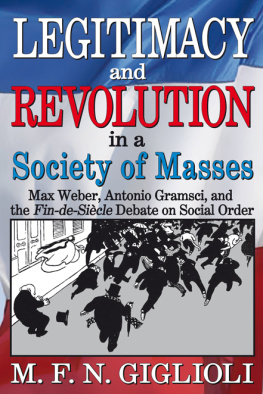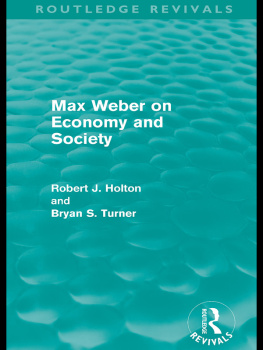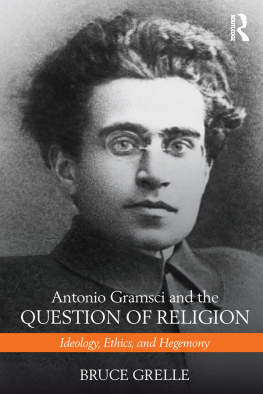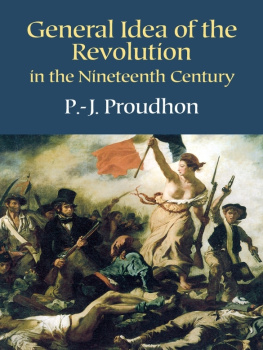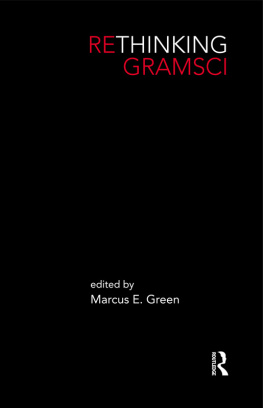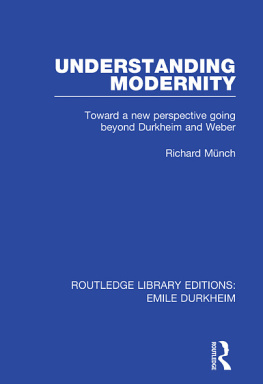LEGITIMACY
and
REVOLUTION
in a
Society of Masses
Max Weber, Antonio Gramsci, and
the Fin-de-Sicle Debate on Social Order
M.F.N. GIGLIOLI

Transaction Publishers
New Brunswick (U.S.A.), and London (U.K.)
LEGITIMACY
and
REVOLUTION
in a
Society of Masses
Contents
Copyright 2013 by Transaction Publishers, New Brunswick, New Jersey.
All rights reserved under International and Pan-American Copyright Conventions. No part of this book may be reproduced or transmitted in any form or by any means, electronic or mechanical, including photocopy, recording, or any information storage and retrieval system, without prior permission in writing from the publisher. All inquiries should be addressed to Transaction Publishers, RutgersThe State University of New Jersey, 35 Berrue Circle, Piscataway, New Jersey 08854-8042. www.transactionpub.com
This book is printed on acid-free paper that meets the American National Standard for Permanence of Paper for Printed Library Materials.
Library of Congress Catalog Number: 2012030969
ISBN: 978-1-4128-5162-6
Printed in the United States of America
Library of Congress Cataloging-in-Publication Data
Giglioli, Matteo Fabio Nels, 1976-
Legitimacy and revolution in a society of masses : Max Weber, Antonio Gramsci, and the fin-de-siecle debate on social order / M.F.N. Giglioli.
p. cm.
Includes bibliographical references and index.
ISBN 978-1-4128-5162-6
1. Legitimacy of government--Europe. 2. Proletariat. 3. Weber, Max, 1864-1920. 4. Gramsci, Antonio, 1891-1937. I. Title.
JC497.G54 2013
320.1--dc23
2012030969
The set of questions surrounding the concept of legitimacy, the peculiar centripetal dynamics that keep a polity together, or, by disappearing, shatter it to pieces, is possibly the most important with which a study of politics may concern itself. As Isaiah Berlin quite correctly remarks, the fundamental question in politics is why a man should obey another, since force alone cannot guarantee universal compliance with rules, but everyone stands to gain from regulated social cooperation. The reason legitimacy is understood to be a central problem in political thought is precisely the perceived indispensability of motivations in favor of obedience, because the willingness to obey authority logically puzzles us at the level of individual rationality, even as we perceive its necessity for the smooth functioning of social interaction as a whole.
Interest in issues with a recognizable bearing on legitimacy has been recurrent in the history of Western political thought. Indeed, beginning at least with La Botie, the question of the grounding of political authority can be seen as the dominant preoccupation of what we have come to think of as the classical tradition of political theorizing, from Grotius to Hobbes, from Locke to Montesquieu, from Rousseau to Kant. Proponents and opponents alike understood nineteenth-century liberalism to issue directly from this tradition and to offer a systematic and comprehensive answer to the question of political legitimacy. However, beginning with the last decades of the nineteenth century, increasing challenges to the liberal image of legitimate order emerged and new formulations were sought for the concept. One of the chief outcomes of the process was the contemporary theorization of legitimacy within the social sciences, which has decisively shed the link between the normative and descriptive (or the motivational and the behavioral) aspects of legitimacy. Such a transformation, I claim, was the consequence of the historical encounter with the new society of masses.
The present work is an attempt to contribute to the intellectual history of the concept of legitimacy during this crucial phase. It takes the form of an investigation into reflection on the concept in Continental Europe during the half century or so following the Paris Commune. In those years, I claim, three major European countriesFrance, Germany, and Italyunderwent momentous changes in social and political conditions that on the one hand ushered in a new, modern world, recognizably similar to our own, and on the other brought the legitimacy issue into dramatic, real-world focus.
The period preceding the First World War was a phase of crisis in the political structures of European States. Issues related to legitimacy became salient in the interests of many leading political thinkers of the age. The fin-de-sicle crisis is admittedly not the only historical instance of an intellectual debate centering around a vast social upheaval, but it possesses characteristics, both material and spiritual, that make it especially valuable as a case study for those who seek insights on the role of legitimacy in the modern world. Let us explore each in turn.
In terms of socioeconomic developments, the end of the nineteenth century saw the consolidation and spreading to the whole European continent of the vast shift in productive processes springing from the Industrial Revolution. The changes in the balance between city and countryside and the rapid development of communications and transportation ushered in a completely novel society, characterized by its mass dimensions, on an altogether different scale of magnitude from the past. At the same time, these years saw the apogee of the modern Nation-State form. The rapidly expanding public bureaucracy undertook the regulation of ever-wider spheres of social interaction as it attempted to carry through the first systematic nation-building projects. If the civilization of machines was attaining unparalleled heights of wealth and material comfort, proving the extent to which social collaboration could multiply individual endeavor, the State was demonstrating similar advances in physical power, internationally as well as domestically. Both industrialism and government bureaucracies, however, required for their functioning an ever-increasing amount of discipline from the individuals subject to their control. The society of masses was a physically and psychologically invasive order.
The political crisis of the fin de sicle proceeded precisely from the search for the means to justify such an invasive but unprecedentedly successful order.
The central decades of the nineteenth century, the heyday of Victorianism, had witnessed the triumph of such a rational, immanent justification of authority in the form of classical liberalism. Therefore, in terms of the history of political thought, the fin-de-sicle crisis can be interpreted as the reaction to the end (or the eclipse) of the hegemony of liberal theory and practice. From the perspective of the ruling classes, the crisis was experienced as an untethering of rational political discourse from collective action. The metaphor of the social contract, with its double implication of free choice of obedience and rational obedience to ones own choice, no longer seemed relevant to modern conditions; the calculating reasonableness of the utilitarian individual appeared as the product of a more and more far-fetched moral anthropology. Indeed, for the period before World War Iand with a centurys hindsightwe can speak of a historical hiatus of the microeconomic reference in the interpretation of politics.
What was to be done with those who rejected what were understood as the rational forms and modes of politics and government? The age of progress had also been obliged to face such dilemmas, as the encounters with Luddism and the colonial Other amply attest. Nevertheless, the fin de sicle signals a qualitative shift in this confrontation that becomes systematic inasmuch as the disciplinary requirements of mass society do not allow resistance to modernity to be safely marginalized, either politically or intellectually. As a result, a very idiosyncratic shift takes place in the intellectual conceptualization of politics. Throughout the history of Western thought irrational behavior was considered an empirical fact, to be deplored or stigmatized, but signifying in itself nothing more than the unavoidable imperfection of the material world, unworthy of further interest as such. In the period we are concerned with, on the contrary, the actual collective behavior of the newly politically relevant masses is taken to be a meaningful and valuable object of analysis in its own right. The sources of collective beliefs are investigated without explicit reference to the normative standards they are to be measured against. It is the methodological revolution that stands at the origin of modern social science.
Next page
